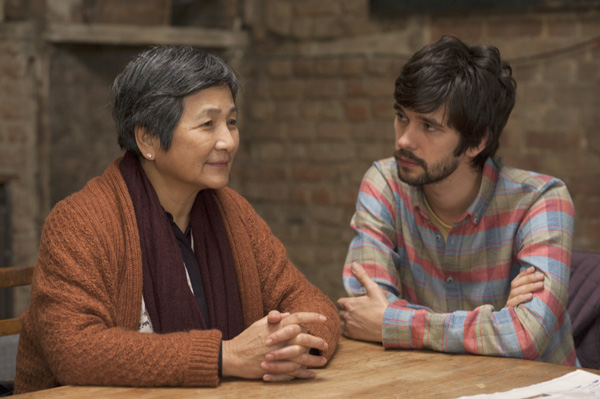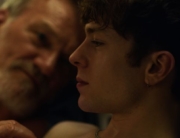The story here is simple enough, but the telling is artful. Ben Whishaw plays Richard, a young man trying to make a connection with Junn (Cheng Pei Pei), the mother of his recently deceased lover, Kai (Andrew Leung). The trouble is that Kai never told his mom he was gay. Further, he put her in an assisted living home when her health wavered. Moving her in with him and Richard would have exposed the truth.
After Kai dies in an accident, Richard is left to play the part of his “best friend,” trying to have a relationship with a woman who resents his existence and who also can’t understand a word he says. Junn never fully integrated into English society, refusing to learn the language, even though the way of life, she says, clung to her skin and changed her within.
Richard spies an opening when he learns Junn is in a December-December romance with Alan (Peter Bowles), a fellow resident. Since Alan speaks no Chinese, the relationship is based on winks and hugs until Richard offers the services of Vann (Naomi Christie), a young woman, to translate for them.
The stammering Alan, who Bowles makes a kind of aged Hugh Grant, is a breath of fresh air in a film that spends a little too long on some of its pauses or meditative shots of branches blowing in the breeze. The plot of Lilting’s first third is not complicated enough to merit its length, but the film hits its stride as the relationship between Junn and Alan develops in unexpected ways. At first their interactions seem like an excuse for Viagra jokes and patronizing sentimentality (aren’t old folks cute?). But when Junn tries to get to know Alan more deeply, she ends up throwing everyone into troubled emotional waters.
Cheng Pei Pei’s performance is what to watch here. From the first moment, she delivers looks that rapidly change from bewilderment to anger to grief and back again. As the story progresses, and we begin to suspect Junn knows more than she lets on, the actress adds ever more layers to her portrayal. By the end, every look from Junn is a kind of architecture.
When Richard finally expresses anger at her stubbornness, the way Junn listens to him is masterful. On the one hand, it is clear from her eyes that she does not understand what he is saying. On the other, those eyes also flicker with a deeper emotional comprehension, itself a product of her sense of guilt.
The film’s last moments sing with poetry, visual and verbal. We end where we began, chronologically, but while the storyline has unfolded, there is more mystery now than before. The story, as mentioned, is easily told. Yet director Hong Khaou has manipulated the telling, with flashbacks and failed fantasies, to better reflect the mysterious substance of life, always more than the sum of its parts.

















Leave A Comment